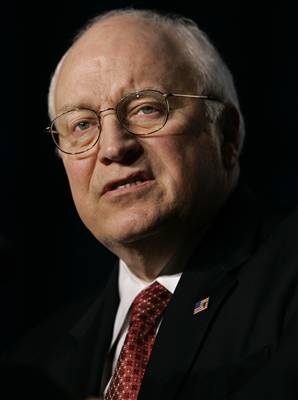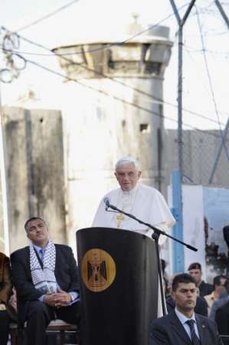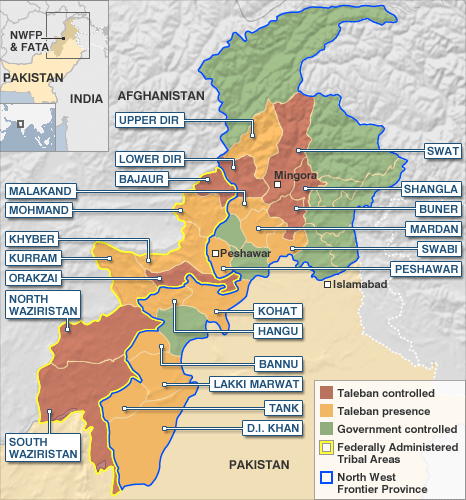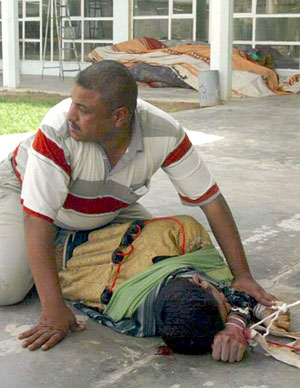Second nuclear test: North Korea does what it says
North Korea did exactly what it said it would do on May 25, 2009, when it conducted a nuclear test as promised in its April 28, 2009, statement in response to UN sanctions imposed on three North Korean firms in accordance with an April 13, 2009, UN Security Council Presidential Statement condemning North Korea’s April 5, 2009, missile test. The test furthers North Korea’s strategic objective of making permanent its status as a nuclear weapons state. North Korea’s announcement of the test shows that a primary political target of North Korea’s nuclear test is domestic, as was the case with North Korea’s April 5th missile launch. [continued…]
No more sunshine in North Korea
North Korea’s latest actions, seen as recklessly dangerous by the outside world, may be broadly explained in three ways. The first is that Pyongyang is in the grip of an intensifying power struggle over the succession to the country’s ailing president and Dear Leader, Kim Jong-il.
The 67-year-old Kim recently re-emerged in public after suffering what appeared to have been a stroke last year. But he did not look well – almost a shadow of his former chubby, occasionally ebullient self. Some Korea-watchers suggest Kim has not fully recovered from the death in 2004 of Ko Young-hee, North Korea’s de facto First Lady and the mother of the younger two of his three sons.
Signs of internal tensions have continued to grow despite Kim’s political resurrection, including a cabinet reshuffle in which about one-third of ministers lost their jobs or were reassigned. A similar shake-up is said to have taken place among the highest ranks of the military. [continued…]
North Korea will not be ignored
… this represents President Obama’s first foreign policy failure. Obama followed the advice of staff who recommended ignoring North Korea. The argument was that North Korea had no place to go and would eventually come back to negotiations. This was a strategy endorsed by many former Bush officials. There was nothing like the diplomatic approaches that Obama has started with Iran–and North Korea noticed.
Obama officials even put preconditions on renewing negotiations, reportedly blocking Special Envoy Stephen Bosworth from going to North Korea until that country promised not to conduct another missile test. Officials also backed the tough line taken by South Korea, including curtailing fuel shipments to the north. Worse, some officials seem to have concluded that North Korea’s program cannot be stopped, that the best we can do is “manage” the problem.
But North Korea will not be ignored. Or managed. Or coerced into compliance or collapse. These approaches were tried in the Bush administration. They failed. They only gave Pyongyang time to increase the threat of its nuclear and missile programs and export of sensitive technologies. [continued…]
Netanyahu bringing Israel closer to war with Iran
Three arguments are normally made to reject the likelihood of an Israeli military option: the complexity of the mission, the U.S. veto and opposition in the government. It is usually assumed that Israel will seek to repeat the 1981 bombing of the nuclear reactor in Iraq. This is only one scenario and not a likely one.
There are other possibilities to consider: a war in the north that drags Iran in, or a strike against a valuable target for the Iranian regime, which leads Supreme Leader Ali Khamenei and Ahmadinejad to take action against “the Zionist regime.” If Iran attacks Israel first, the element of surprise will be lost, but then Israel’s strike against the nuclear installations will be considered self-defense.
The second argument, regarding American opposition to a strike, depends on the circumstances. It’s hard to imagine that Obama will order the interception of Israeli aircraft on the way to Natanz if all other ways of stopping the centrifuges have failed. Clearly the administration will have to chastise Israel, and let’s not forget the statements by CIA chief Leon Panetta, who warned against any operation not coordinated with the United States. But no one knows how Obama will behave in the moment of truth. He told Newsweek that he will not tell Israelis what their defense requirements are. Netanyahu liked this very much. [continued…]
President Obama’s Iran policy has, in all likelihood, already failed. On its present course, the White House’s approach will not stop Tehran’s development of a nuclear fuel program — or, as Iran’s successful test of a medium-range, solid-fuel missile last week underscored, military capacities of other sorts. It will also not provide an alternative to continued antagonism between the United States and Iran — a posture that for 30 years has proved increasingly damaging to the interests of the United States and its allies in the Middle East.
This judgment may seem both premature and overly severe. We do not make it happily. We voted for Barack Obama in 2008, and we still want him to succeed in reversing the deterioration in America’s strategic position. But we also believe that successful diplomacy with Iran is essential to that end. Unless President Obama and his national security team take a fundamentally different approach to Tehran, they will not achieve a breakthrough.
This is a genuine shame, for President Obama had the potential to do so much better for America’s position in the Middle East. In his greeting to “the people and leaders of the Islamic Republic of Iran” on the Persian New Year in March, Mr. Obama included language meant to assuage Iranian skepticism about America’s willingness to end efforts to topple the regime and pursue comprehensive diplomacy. [continued…]
Iran’s Ahmadinejad rejects Western nuclear proposal
Iran’s President Mahmoud Ahmadinejad on Monday rejected a Western proposal for it to “freeze” its nuclear work in return for no new sanctions and ruled out any talks with major powers on the issue.
The comments by the conservative president, who is seeking a second term in a June 12 election, are likely to further disappoint the U.S. administration of President Barack Obama, which is seeking to engage Iran diplomatically. [continued…]
Big crowd for moderate reflects serious challenge to Iran’s leader
The strongest challenger to President Mahmoud Ahmadinejad attracted an unusually large and exuberant crowd of supporters on Monday during a campaign speech in this northwest city near the candidate’s birthplace, with only a few weeks before national elections that the incumbent stands a serious chance of losing.
The crowd for the challenger, Mir Hussein Moussavi, was extraordinary not only for its size — an estimated 30,000 — but also because the supporters were not paid, given free food, bused in or ordered by their workplaces to attend, a tactic sometimes used by Mr. Ahmadinejad’s campaign.
Many traveled here in private cars and learned about the rally despite new government restrictions on Facebook, the social networking site, which Mr. Moussavi’s campaign had been using to spread word of his candidacy among the country’s predominantly young electorate. The supporters gave a rousing welcome to Mr. Moussavi, who was born in Khameneh, a small town in the Azerbaijan area of Iran. [continued…]
They may not want the bomb — and other unexpected truths
Everything you know about Iran is wrong, or at least more complicated than you think. Take the bomb. The regime wants to be a nuclear power but could well be happy with a peaceful civilian program (which could make the challenge it poses more complex). What’s the evidence? Well, over the last five years, senior Iranian officials at every level have repeatedly asserted that they do not intend to build nuclear weapons. President Mahmoud Ahmadinejad has quoted the regime’s founding father, Ayatollah Ruhollah Khomeini, who asserted that such weapons were “un-Islamic.” The country’s Supreme Leader, Ayatollah Ali Khamenei, issued a fatwa in 2004 describing the use of nuclear weapons as immoral. In a subsequent sermon, he declared that “developing, producing or stockpiling nuclear weapons is forbidden under Islam.” Last year Khamenei reiterated all these points after meeting with the head of the International Atomic Energy Agency, Mohamed ElBaradei. Now, of course, they could all be lying. But it seems odd for a regime that derives its legitimacy from its fidelity to Islam to declare constantly that these weapons are un-Islamic if it intends to develop them. It would be far shrewder to stop reminding people of Khomeini’s statements and stop issuing new fatwas against nukes. [continued…]
Mohamed ElBaradei: ‘They are not fanatics’
The election of Benjamin Netanyahu as Israel’s Prime Minister has complicated matters. He’s left open the possibility Israel will attack Iran’s nuclear facilities.
Unfortunately, we have to keep saying what we have been saying for years (and being vilified for it by the neocons): there is no military solution. There is only a diplomatic solution. Israeli President Shimon Peres made the point that you cannot bomb the knowledge [of Iranian nuclear scientists]. I wish that sort of thing had been said three years ago.
Had the Bush administration been more flexible, do you think it could have had a deal to freeze the Iranian enrichment program in its experimental phases?
There is no way you are able to deny them the knowledge. But if they do not have the industrial capacity, they do not have weapons. It is as simple as that. I have seen the Iranians ready to accept putting a cap on their enrichment [program] in terms of tens of centrifuges, and then in terms of hundreds of centrifuges. But nobody even tried to engage them on these offers. Now Iran has 5,000 centrifuges. The line was, “Iran will buckle under pressure.” But this issue has become so ingrained in the Iranian soul as a matter of national pride. They talk about their nuclear program as if they had gone to the moon. And they also understood—unfortunately, not wrongly—that if you have the know-how, you’re still kosher within the Nuclear Non-Proliferation Treaty. And yet you are sending a message: I can do this; I have bought myself an insurance policy, and you don’t want to mess with me. [continued…]
Israel pulls plug on Iran regime change shop
Israeli media are reporting that a small and unconventional Iran office in the Israeli Ministry of Defense will be shut down. The 30-year-old office has been headed by 83-year-old Uri Lubrani, who was de facto Israeli ambassador to Iran in the 1970s and famously predicted the fall of the shah. While the closure of the office may seem a minor bureaucratic matter, it also speaks to the demise of an idea that gained currency in some Washington circles just a few years ago and then faded: that the United States might support a plan of regime change in Iran.
Lubrani and his aide Itzhak Barzilay, who both served in Israel’s embassy in Iran in the 1970s, ran the small office on a shoe-string budget in an outpost of low buildings on the Defense Ministry’s Tel Aviv compound, overshadowed by two gleaming ministry office towers.
The unit (technically known as the Lebanon coordinator unit, perhaps because of Iran’s role in Lebanon) had in later years just four people and ran on a budget of just over a million dollars per year, according to Haaretz. “The main purpose of the unit was to maintain links with the Iranian community and political organizations, and follow the media in Iran.” [continued…]
Israel’s parliament to consider loyalty oath
An ultranationalist party headed by the Israeli Foreign Minister said yesterday that it has prepared legislation linking citizenship to an oath of allegiance, in what amounted to a threat to the country’s Arabs to swear loyalty to the Jewish state or risk severe punishment.
The bill follows a separate proposal on Sunday by the same party that would make it illegal for Arabs to mourn the “catastrophe” – the term Palestinians use to describe their defeat and exile in the war that surrounded Israel’s founding.
Both proposals by the Foreign Minister Avigdor Lieberman’s Yisrael Beitenu party focus on the perceived disloyalty of the country’s Arab citizens, roughly a fifth of Israel’s population of seven million. [continued…]
Rahm Emanuel’s Mideast mission
William Daroff, who directs the Washington office of the United Jewish Communities and knows Emanuel, calls him “Obama’s secret weapon.” It’s not just that Obama can use Emanuel’s Israel-friendly reputation as a kind of shield, allowing him to display “tough love” toward the Jewish state. Daroff told NEWSWEEK Rahm has such a nuanced understanding of Israeli politics, he can easily act as the president’s BS detector as negotiations go forward. “The Israelis aren’t going to be able to slide anything past the administration because Rahm is who he is.” The Hebrew-speaking Emanuel, as much as anyone on the American side, will know if the Israeli prime minister is bluffing about his “red line” on Iran, or what he can really do about halting settlements in the West Bank. (Asked to comment, Emanuel’s spokeswoman, Sarah Feinberg, told newsweek that his goal was to ensure that the president has “every option available to him as we pursue peace.”)
Emanuel’s status as a near-native son gave some Israelis and Jews the impression he would be their guy on the Obama team—the pro-Israeli with the receptive ear. He had those golden Zionist credentials, after all: His father, Benjamin, had been a member of the Irgun, the right-wing Jewish militia that existed before Israeli independence. His Uncle Emanuel had been killed in a skirmish with Arabs back in the ’30s, prompting the family to change its name from Auerbach to honor him. But some in the Jewish community have been disappointed. Even his own rabbi, Asher Lopatin, has doubts about his absent congregant. “There is a lot of disappointment,” says Lopatin, who presides over the Modern Orthodox Anshe Sholom B’nai Israel Congregation in Chicago. “In some ways there was a heightened expectation because Rahm is so connected to Israel and the Jewish community. Instead what we’ve seen is more of the tough Rahm Emanuel. Not the warm Rahm.” [continued…]
My hotel is filled with young people who have come to ‘break the siege,’ like freedom riders
It’s Monday night in Egypt. We are in El-Arish, a resort town about 20 minutes from the Gaza border, where we will go first thing tomorrow morning. I’m with a group of 13 activists and humanitarians mostly from New York, but the hotel is teeming with 45 or so other activists who have answered the call to come to Gaza to try and break the blockade. Most of them are young and sunburned; they have spent the day at the border not getting in. The good news tonight is that a European delegation of 100 people, with a convoy of ambulances and trucks and cars, seems to have gotten through the border after being held up by Egyptian authorities for several days.
We got that rumor at dinner and it has filled our group with confidence. Afterward, we bought bicycle pumps for the dozens of soccer balls we are bringing in, and I grabbed a handful of cosmetics tonight, just because life is not bread alone.
It’s an inspiring scene in the hotel. I wonder if Memphis hotels didn’t feel like this during the freedom rides. You see college kids walking around in 1948 (Nakba) t-shirts, and Penn State t-shirts too. Some carry guitars to play at the border tomorrow, many of the women wear head scarves. You sense that the issue has finally shed its oriental taboo and taking hold among the young. [continued…]
Jerusalem is not on the table, says Israel
Israel and the US now appear to be on a collision course after the announcement yesterday by Israel’s Prime Minister Benjamin Netanyahu that Israel would continue expanding its existing settlements.
Mr Netanyahu told the first cabinet meeting since his meeting with US President Barack Obama that Israel would not begin new settlements on the West Bank but that it would allow “natural growth” in existing settlements.
This was clearly at odds with Mr Obama’s request last week that Israel should stop settlement activity, a request reinforced the following day by US Secretary of State Hillary Clinton, who specifically said there should be an end to “natural growth” after Israeli officials had been using the term following the meeting with Mr Obama. [continued…]
New evidence points to Hezbollah in Hariri murder
In months of painstaking work, a secretly operating special unit of the Lebanese security forces, headed by intelligence expert Captain Wissam Eid, filtered out the numbers of mobile phones that could be pinpointed to the area surrounding Hariri on the days leading up to the attack and on the date of the murder itself. The investigators referred to these mobile phones as the “first circle of hell.”
Captain Eid’s team eventually identified eight mobile phones, all of which had been purchased on the same day in the northern Lebanese city of Tripoli. They were activated six weeks before the assassination, and they were used exclusively for communication among their users and — with the exception of one case — were no longer used after the attack. They were apparently tools of the hit team that carried out the terrorist attack.
But there was also a “second circle of hell,” a network of about 20 mobile phones that were identified as being in proximity to the first eight phones noticeably often. According to the Lebanese security forces, all of the numbers involved apparently belong to the “operational arm” of Hezbollah, which maintains a militia in Lebanon that is more powerful than the regular Lebanese army. While part of the Party of God acts like a normal political organization, participating in democratic elections and appointing cabinet ministers, the other part uses less savory tactics, such as abductions near the Israeli border and terrorist attacks, such those committed against Jewish facilities in South America in 2002 and 2004.
The whereabouts of the two Beirut groups of mobile phone users coincided again and again, and they were sometimes located near the site of the attack. The romantic attachment of one of the terrorists led the cyber-detectives directly to one of the main suspects. He committed the unbelievable indiscretion of calling his girlfriend from one of the “hot” phones. It only happened once, but it was enough to identify the man. He is believed to be Abd al-Majid Ghamlush, from the town of Rumin, a Hezbollah member who had completed training course in Iran. Ghamlush was also identified as the buyer of the mobile phones. He has since disappeared, and perhaps is no longer alive. [continued…]
Spiegel article probably a plant
The Der Spiegel article is suspicious for many reasons. Here are a few put forward by SC readers:
1. The timing suggests that the story was released to provide maximum damage to Hizbullah’s and Aoun’s likely success in the elections.
2. The most recent UN investigative teams (in contradistinction to Mehlis) have been excellent at not politicizing or leaking evidence from the case.
3. Nasrallah has no record of assassinating Lebanese political figures that stand in his way.
4. The accusations against Syria in 2005 and 2006 turned out to be based on false witness, why should we trust this bombshell?
5. There are accusations that Der Spiegel and Israeli intelligence are in close cahoots. [continued…]
Pakistani refugee crisis poses peril
Bacha Zab, a 32-year-old fruit salesman, dodged army shelling and Taliban sniper fire to escape his native Swat Valley. But when he reached the safety of a government-run refugee camp in this northwestern Pakistani city, he was told there was no more room.
Instead, for the past 16 days, Zab, his wife and their four children have been in the care of a private Islamic charity with close ties to a banned militant organization. “We are asking for help from the government, but they won’t give it,” Zab said. “In the government camps, there are only problems.”
The government has been overwhelmed by the human tide that has washed over the northwest as about 2 million people have fled fierce clashes in Swat. With Pakistan experiencing its largest exodus since the nation’s partition from India in 1947, only a fraction of the displaced civilians are receiving assistance in government-run camps. The rest are fending for themselves or getting help from private charities, including some that are allied with the very forces the Pakistani army is fighting in Swat. [continued…]
Say what you will about Dick Cheney, at least he’s consistent. While he was in office, the Vice President made a practice of exploiting the fear and loss wrought by the 9/11 attacks to advance his own political agenda—and he’s still doing it now. During his speech at the American Enterprise Institute on Thursday, according to Dana Milbank’s calculations in the Washington Post, “Cheney used the word ‘attack’ 19 times, ‘danger’ and ‘threat’ six times apiece, and 9/11 an impressive 27 times.”
In this putative rebuttal to Obama’s speech on national security, Cheney described how he spent the morning of 9/11 “in a fortified White House command post,” receiving “the reports and images that so many Americans remember from that day,” and then declared:
In the years since, I’ve heard occasional speculation that I’m a different man after 9/11. I wouldn’t say that. But I’ll freely admit that watching a coordinated, devastating attack on our country from an underground bunker at the White House can affect how you view your responsibilities.
Since he’s evoking his experience as a rationalization for torture, this might be a good time to review exactly what it was that Cheney was doing in the bunker on that terrible day. [continued…]
Land of the safe and home of the cruel
Between May 15, when President Obama announced that he would keep the Bush-era Military Commissions to try enemy combatants, and May 21 when he replied to the opponents of his decision to close Guantanamo, we had an opportunity to judge the temper of this administration on issues of national security and the defense of civil liberties.
Obama’s May 21 speech at the National Archives combined a general repudiation of the Bush-Cheney policies with a surprising concession to methods that the former vice president, Dick Cheney, tried to graft onto the Constitution. This approach the Constitution repels as surely as a healthy body rejects poison; for in the Cheney interpretation, the common-law right of prisoners to be charged with a crime and to have due process in challenging the accusation was abridged in cases specified by the executive. Cheney singled out for detention as “enemy combatants” persons suspected of being hard-core terrorists without there being sufficient identification to charge or sufficient evidence to convict them.
We may think ourselves a safe country, but we can hardly be the United States of 1776, of 1865, and of 1945 so long as we retain a power imported by Dick Cheney and his lawyers from the 17th century into the 21st — the power of government to imprison and keep in jail a person against whom nothing has been proved and nothing charged. It is a bondage as complete as slavery; and like slavery, it can last for life. [continued…]


 y investigations have revealed to me — vividly and clearly — that once the Abu Ghraib photographs were made public in the Spring of 2004, the CIA, its contractors, and everyone else involved in administering “the Cheney methods of interrogation”, simply shut down. Nada. Nothing. No torture or harsh techniques were employed by any U.S. interrogator. Period. People were too frightened by what might happen to them if they continued.
y investigations have revealed to me — vividly and clearly — that once the Abu Ghraib photographs were made public in the Spring of 2004, the CIA, its contractors, and everyone else involved in administering “the Cheney methods of interrogation”, simply shut down. Nada. Nothing. No torture or harsh techniques were employed by any U.S. interrogator. Period. People were too frightened by what might happen to them if they continued.

 ast sums of money are being lavished by Western aid agencies on their own officials in Afghanistan at a time when extreme poverty is driving young Afghans to fight for the Taliban. The going rate paid by the Taliban for an attack on a police checkpoint in the west of the country is $4, but foreign consultants in Kabul, who are paid out of overseas aids budgets, can command salaries of $250,000 to $500,000 a year.
ast sums of money are being lavished by Western aid agencies on their own officials in Afghanistan at a time when extreme poverty is driving young Afghans to fight for the Taliban. The going rate paid by the Taliban for an attack on a police checkpoint in the west of the country is $4, but foreign consultants in Kabul, who are paid out of overseas aids budgets, can command salaries of $250,000 to $500,000 a year. he crowds at the restaurants are thinning out. Parents have started to escort their children to school again. And cellphones are ringing more often than usual, with family members checking in just to ask, “Are you OK?” or “Is everyone safe?”
he crowds at the restaurants are thinning out. Parents have started to escort their children to school again. And cellphones are ringing more often than usual, with family members checking in just to ask, “Are you OK?” or “Is everyone safe?”